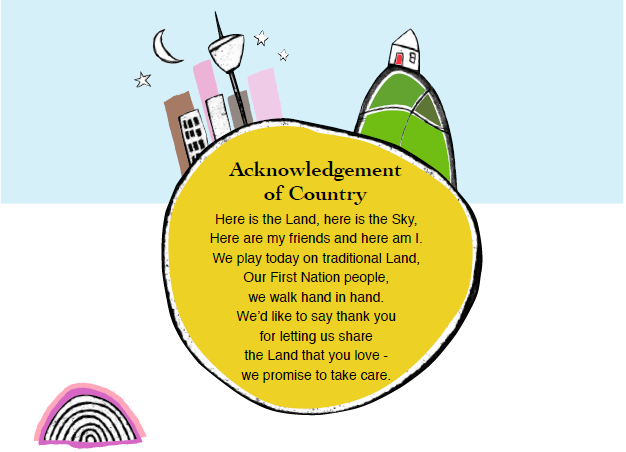Stories for Simon
Shalom is excited to share the Stories for Simon book by author Lisa Sarzin, illustrated by Lauren Briggs with families as a tool to start the conversation about reconciliation.
Through the generous funding from the JCA Social Justice Fund, we have created this resource, linking Jewish values to those of the First Nations people. Our goal is for this to be a long serving resource that you can reference with your family.
The journey of reconciliation is acknowledging the past and building the pathways to a better future.
read by Remi Ferguson, of the Ngemba Yuwaalaraay Peoples
A middah is a Jewish value or virtue and it is a smart way to live.The Torah teaches that we should always be working towards becoming better people. We must always strive to correct our faults and improve our character.
We must conduct ourselves in a way that does not offend those around us. Judaism requires each of us to behave in a respectable fashion. This is called Derech Eretz. Included in Derech Eretz is respect for elders and teachers and respect for the laws of the land in which we live.
We have taken 12 Middot and linked our Jewish Values with those of First Nations Peoples.

Humility / Anavah
Now Moses was a very humble man, more so than any other man on earth.
(Bamidbar 12:3)
Judaism’s greatest leader, Moses, is described as being very humble. Humility is something very important in Judaism, it is meant to be how we live our life. Yes, we are a very proud people, with many accomplishments to be proud of, but we can always do more, and help change the world for the better.
Even though many of our families have only made Australia their home in the last one hundred years, for a very long time European settlement in Australia was seen as the best thing to have happened to this land. For a long time no one cared about First Nations people, their culture, connection to land, or that they have been here for tens of thousands of years.
Every step we take on Australia should be done very humbly. We should always remember that there have always been others who have stepped on this land and called it their own. First Nations people never gave up their connection or ownership of their land, and we need to respect that as if we were humble visitors.
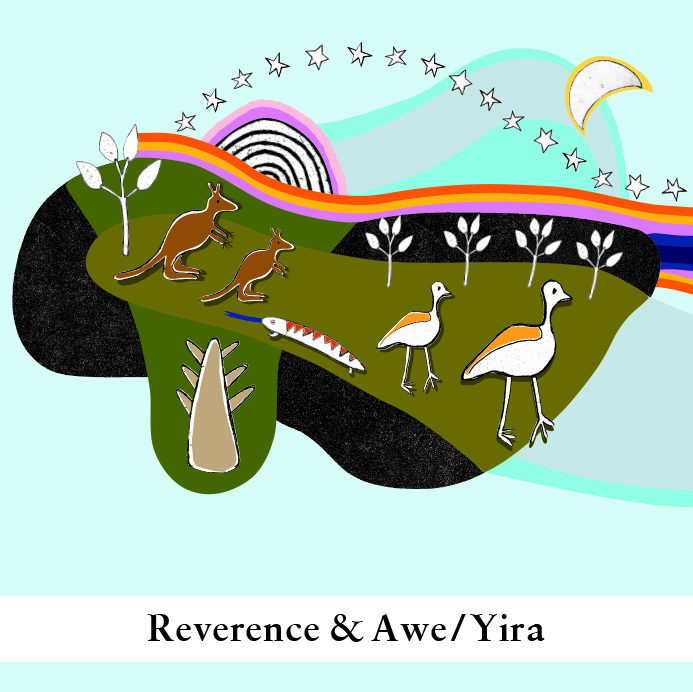
Reverance & Awe / Yira
“I give thanks before you, King living and eternal, for You have returned within me my soul with compassion; abundant is Your faithfulness!”
(Modeh Ani)
Every morning Jews wake up and sing Modeh Ani a song that reminds us to live each day with deep respect, amazement, and wonderment. We should treat every day a blessing. How lucky we are to be alive.
When we do an acknowledgement of country we are revering the land on which we stand and are in awe of her people and their culture and history.
.
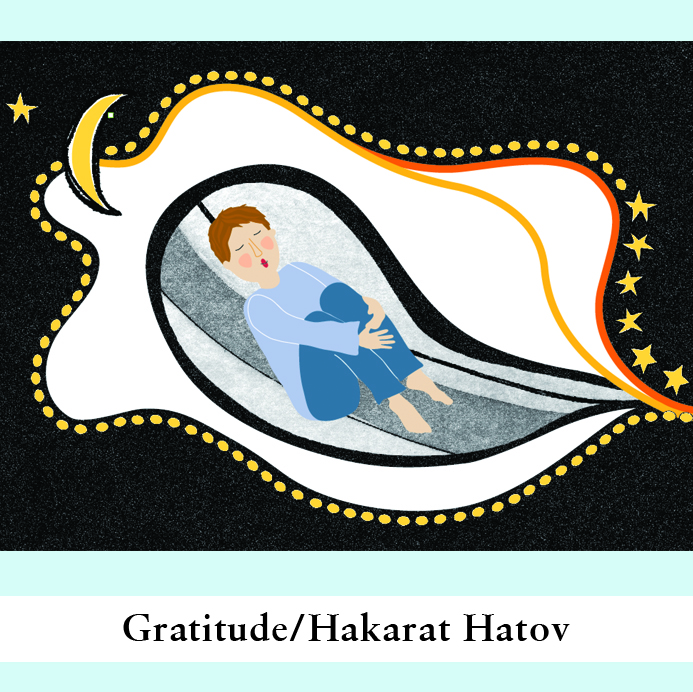
Gratitude / Hakarat Ha Tov
“Who is rich? Those who rejoice in their own portion.”
(Pirkei Avot 4:1)
Judaism encourages us to always give gratitude. Whether it is saying blessings when eating, or respecting our parents, or simply saying thank you. Gratitude keeps us humble and aware that so many things are out of our power, so when we are given something then we should be very lucky and thankful for it.
For First Nations peoples gratitude is part of kanyini. Aunty (Rev) Janet Turpie-Johnston asks all of us, “How are we ultimately going to honour this relationship with the very thing, the very earth, the very waters, the very air, the very sky, that gives us life and existence?”
We are grateful to be in Australia and living in a land with so much rich culture and history and to be able to learn about and connect to First Nations people.
What are you grateful for?
.
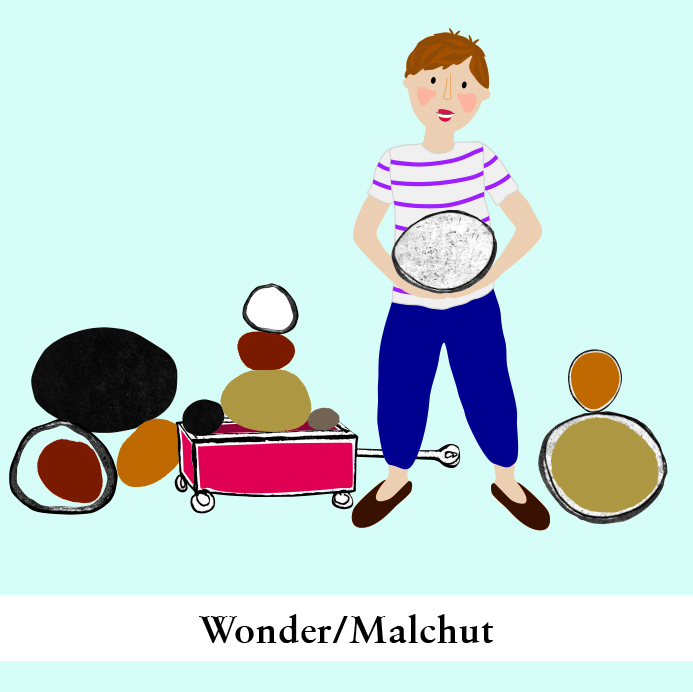
Wonder / Malchut
“Get up in the morning and look at the world in a way that takes nothing for granted. Everything is phenomenal; everything is incredible; never treat life casually. To be spiritual is to be amazed.”
(Abraham J Heschel)
Judaism asks us to look around the world and constantly be amazed at what we see. We have different blessings for different natural things. We are always meant to be exploring and appreciating the world around us.
There is a beautiful First Nations proverb “We are all visitors to this time, this place. We are just passing through. Our purpose here is to observe, to learn, to grow, to love…and then we return home.”
For First Nations peoples a sense of wonder brings about respect and coexistence with the land and other people. There is no ownership. But rather a constant sense of connection, respect and awe.
.
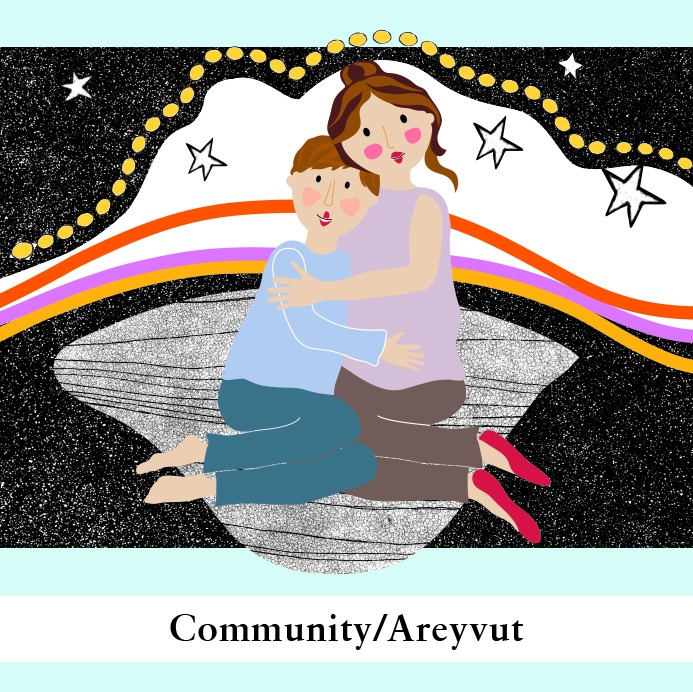
Community Mindedness / Areyvut
“If I am not for myself, who will be for me? But if I am only for myself, what am I? If not now, when?”
(Rabbi Hillel, Pirkei Avot 1:14)
Judaism places communal responsibility as being very important. We need to look after those people who are in our community and care for them whether they are Jewish or not. We always need to look after ourselves, but we also need to look outside our homes and see who is in need of help.
First Nations peoples have a deep connection to land as a way to connect people together. land relates to all aspects of existence – culture, spirituality, language, law, family and identity. Each person is entrusted with the knowledge and responsibility to care for their land, providing a deep sense of identity, purpose and belonging.
Did you know that in Australia there are about 500 different First Nations, each with their own land, language and culture?
Do you know which land you live on? Click here to find out!
.

Justice / Din
Justice, justice, you shall pursue!
(Devarim 16:20)
One of the commands to Jews is to constantly be just and fair. We have to always try and do what is right and stand up for what is right.
In Australia for a long time First Nations children were separated from their parents. This was a terribly unjust action by the Australian government and people, which caused a lot of pain for all First Nations people and still impacts them today.
In 2008 Australian Prime Minister Kevin Rudd made a very important speech to apologise to First Nations peoples for the terrible wrongs that had been caused to them, and especially to the Stolen Generations.
This was an important first step on the path for reconciliation.
What can you do to ensure that you are just and fair in all of your actions?
“If I am not for myself, who will be for me? But if I am only for myself, what am I? If not now, when?”
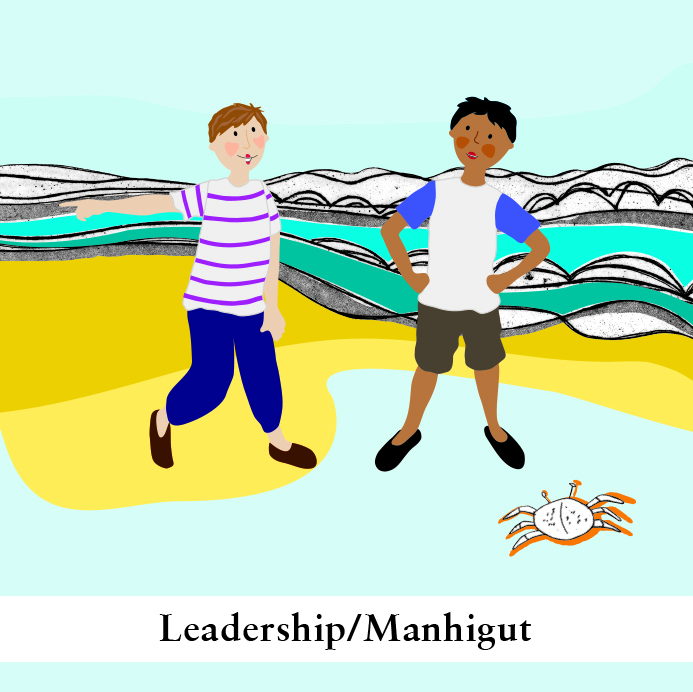
Leadership / Manhigut
“One who is appointed over a community becomes the servant of the community”
(Talmud, Horayot 10a)
In Judaism we have many types of leaders. Prophets, Kings, Priests, Rabbis. Each of them have important roles, but they are never meant to have complete control. They are there to serve the community, and to teach and pass on our deep culture and knowledge from one generation to the next.
First Nations peoples have a concept called Elder. An Elder is someone who is seen as a carer of knowledge and tradition, and who has permission to share those knowledge and beliefs.
Elders can often be called Aunty or Uncle by First Nations peoples
In an Acknowledgement of Country we pay respect to Elders past, present and future.
.
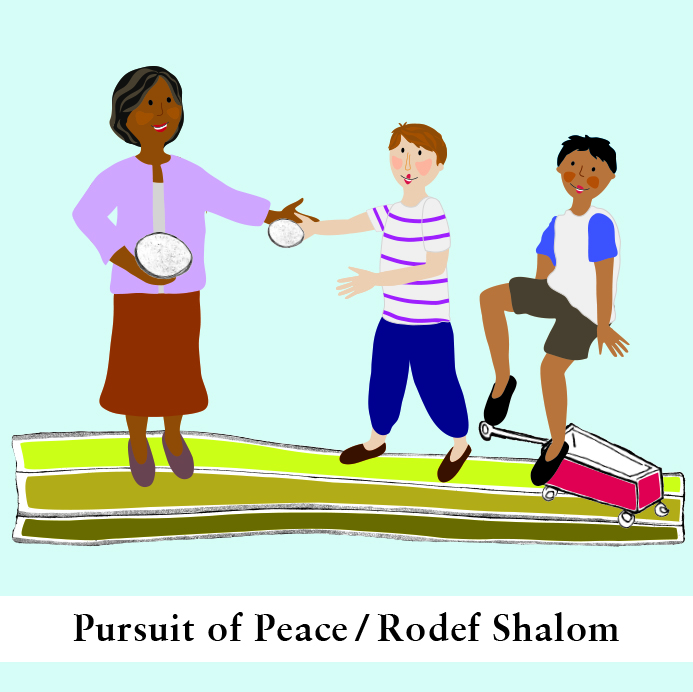
Pursuit of Peace / Rodef Shalom
“Be like the students of Aaron: “loving peace, pursuing peace”
(Pirkei Avot 1:12)
In Judaism we are constantly striving to bring peace into the world. Peace is created by completeness and harmony.
One of our most famous songs is:
Oseh shalom bimromav
Hu ya’aseh shalom aleinu
V’al kol Yisrael
V’imru: amen.
May the one who creates peace on high bring peace to us and to all Israel. And we say: Amen.
Kanyini is best expressed in English as the combination of the two words ‘Responsibility’ and ‘Unconditional Love’, but it is actually a relationship; it is an enormous caring with no limit – it has no timeframe: it is eternal. – Uncle Bob Randall
Part of reconciliation is First Nations peoples wanting to have a Makarrata, a Treaty or an agreement-making. It captures their aspirations for a fair and honest relationship with government and a better future for their children based on justice and being able to make their own decisions.

Creativity / Yetzirah
“There is nothing new under the sun.”
(Ecclesiastes)
In Judaism we believe that all human beings are created in the image of God and are provided with the ability to be part of the creative process. Judaism has always been involved in creative experiences – music, painting, theatre and movies just to name a few.
First Nations people believe that the world was created in the Dreamtime, called Tjukurrpa, and the creation is an ongoing process which we are all involved with. Tjukurrpa connects all country, places, objects, songs and stories.
.
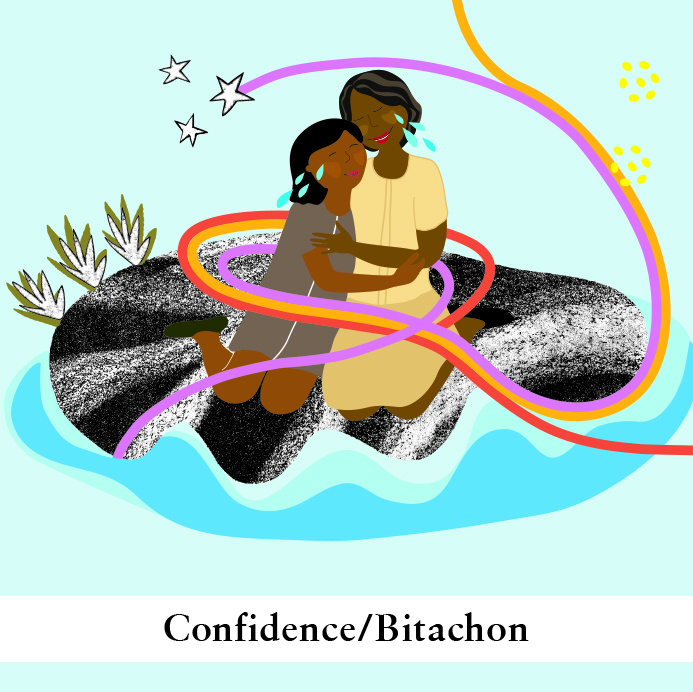
Confidence / Bitachon
“If you will it, it is no dream”
(Theodor Herzl)
In Judaism we have had many hardships. We have had to live in many different places around the world, mostly because other people kept making us move. But we had the confidence to stand very tall and hope to one day return to the land of Israel and regain our connection to our land and develop our beautiful and rich culture and heritage.
First Nations people are very proud of their culture and heritage. They have the confidence to stand up and say what they need to be able to continue their culture and make it part of Australia’s way of life.
Did you know that a First Nations person, from Yorta Yorta (in Victoria) had the confidence to not only stand up for the rights of First Nations peoples by petitioning King George the fifth, established the first protest for First Nations rights, but he even protested the German Consulate in Melbourne at how they were treating the Jews in Europe.

Understanding / Bina
“Any fool can know. The point is to understand.”
(Albert Einstein)
In Judaism we seek to understand how others are feeling or acting. One of our most important teachings is to remember that once upon a time we were slaves in a strange land, and that we should understand what others are going through.
A large part of reconciliation is to begin to understand what has occurred to Australia’s First Nations people.
How did European arrival hurt them?
What were the consequences of building cities and farms on the land?
What do First Nations people want for themselves to ensure that their very proud and rich culture is respected, understood and at the centre of Australian life?
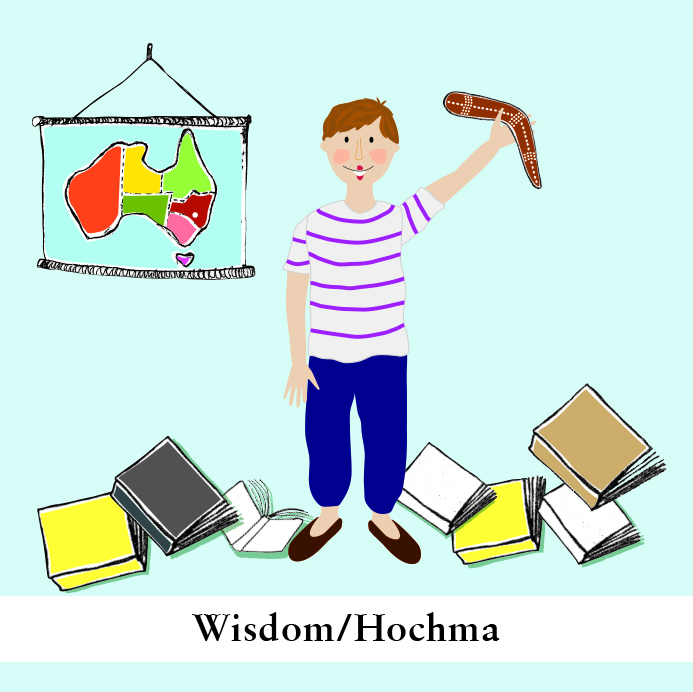
Wisdom / Hochma
Who is wise? The one who learns from every person.
(Pirkei Avot 4:1)
In Judaism we search for wisdom from many places. We have been called the People of the Book. We have the Torah and all the wise teachings of the Rabbis and scholars from thousands of years.
Australia’s First Nations peoples share wisdom through a way of living called Kanyini, a living wisdom that connects all aspects of life, and is passed down from one generation to another through Elders past present and future.

